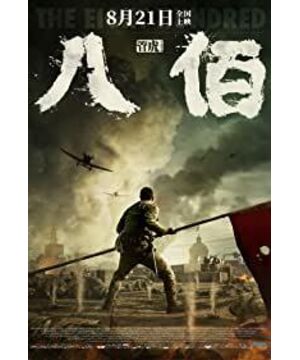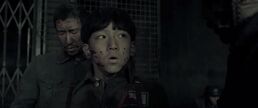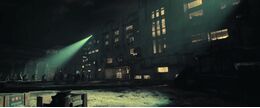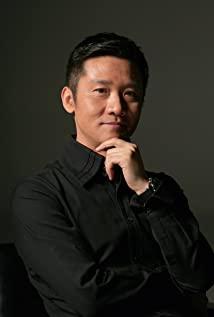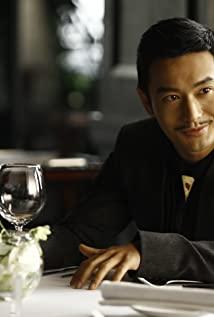01
"Eight Hundred" is a movie about "people".
The title of the movie: Yaobai.
The reason why we use "hundred" instead of "hundred" is to remind us that "eight hundred" is not just a number, but a piece of life.
These people have truly existed in this world.
We now call them "heroes" and "martyrs", but never forget that they are first and foremost ordinary people, and they also have their own fears and love.
Guided by a group of group portraits, the film takes us into the final battle of the Battle of Songhu in 1937.
Under the infectious lens of photographer Cao Yu, wartime Shanghai became a hellish existence.
The tone of the whole film can be described in four words: gloomy and miserable.
The picture is always shrouded in a faint lush green.
Above the scorched earth, there are no intact buildings.
Looking up, there are only broken brick walls, standing tremblingly on the rubble, which may collapse at any time.
Eight hundred warriors came to this city forgotten by the world to fight a battle that was doomed to fail.
They entered the Sixing Warehouse and wanted to guard this island-like building for four days and four nights.
What is the state of the people facing the war?
Brave and fearless? Willing to die?
"Eight Hundred" discards these assumptions.
It tells us that in the face of war, people's most likely first reaction is to "flee".
As soon as the film begins, the camera is aimed at a field mouse.
I saw it drilled out of the ground and looked around. When I heard the footsteps of the marching army, it was so frightened that it quickly got back into the hole.
This shot is very symbolic.
It expresses an "animal" instinct, whether it is a mouse or a human, when faced with an unpredictable danger, the first reaction is "escape".
This is also the most special part of "Eight Hundred". Its protagonists are not traditional positive characters, but a group of skirmishers on the battlefield.
These skirmishers have different personalities.
The old iron played by Jiang Wu is rough on the outside and fragile on the inside.
The old abacus played by Zhang Yi is cunning and cunning.
Duanwu and Xiaohubei are still minor children.
They didn't understand what war was, so they joined the army in confusion.
The sheep crutch, played by Wang Qianyuan, is a battle-hardened "old soldier".
He didn't want to run, he just lived by experience and didn't work hard every day.
In this group of people, you can't see the slightest "hero" shadow.
Instead, they are just a bunch of ordinary people, no different from most people.
They used to live their own lives.
Some are farming at home, some are herding sheep in the mountains, some have just gotten married, and some are still young and ignorant...
If there is no war, their life may be dull or rich.
But when the war hits, all "what ifs" come to nothing.
They are coerced into it without preparation, and face the test of life and death every day.
Dragon Boat Festival said: "I just want to take a look at the bustling Shanghai."
But what he didn't expect was that at this time Shanghai had become the grave of countless people, including his.
Such is the cruelty of war.
It drags everyone's fate out of control, and you have nowhere to go and no choice for that.
It should be said that "Eight Hundred" has a very clear understanding of the cruelty of war.
So it can look at these cowardly people with a kind of sympathy, and boldly declare: cowardice is innocent!
Not only that, it also specially arranged a character to make him "cowardly to the end".
This man is an old abacus.
The old abacus has been trying to escape. If it is changed to a normal movie, it is usually arranged like this: let him finally die on the way to escape successfully, and he died unexpectedly, in order to laugh at his cowardice and reflect the absolute fairness of God.
But "Eight Hundred" did not.
The old abacus finally ran.
He put on the windbreaker he picked up, crossed the river to the concession area, and finally survived.
What's more intriguing is that the person who let him go was the one who wanted to run at first but stayed in the end - the Dragon Boat Festival.
The confrontation between the two is interesting.
The interesting thing is that the Dragon Boat Festival did not impose this choice on others because of his choice of "persistence".
On the contrary, he still forgave the cowardice of the old abacus.
Because he knows that in the face of cruel things like war, not everyone has the ability to choose to be strong.
This stroke is an extremely rare stroke in "Eight Hundred".
It reveals to us a truth that has been repeatedly overlooked: Only by allowing "true cowards" can "true heroes" be born.
Why?
Simple.
Because only when "cowardice" is an option, still choosing to be a "hero" is so valuable.
Just like the sheep crutches, Laotie, Dragon Boat Festival, Xiaohubei in the film...
They finally overcame their inner cowardice, took up guns, and fought for their beliefs.
They were born mortals, but they did things beyond mortals.
Isn't this true heroism?
02
Another thing that surprised me about "Eight Hundred" is that it tries to explore the meaning of "image".
It is not difficult to find that this movie implies a lot of cinephile elements.
If you look closely, you can even see the general context of Chinese film history .
This thread is complete.
First, it's shadow play .
In the four-line warehouse, the Shandong soldier played by Li Chen performed a shadow puppet show for everyone.
At that moment, time goes back to the "pre-movie era".
What doesn't change is the curtain, the light and shadow, and the crowd watching.
After that, "Dingjun Mountain" .
In the second half of the film, when Lao Tie was guarding the flag on the roof, he sang exactly the name of the Peking Opera "Dingjun Mountain".
Needless to say, anyone who is familiar with Chinese film history knows that in 1905, in the Fengtai Photo Studio in Beijing, the famous old student Tan Xinpei performed "Dingjun Mountain" in front of the camera, marking the birth of China's first film.
Again, black and white recording images .
In the film, a "reporter" from the concession area took pictures of the battlefield with a handheld camera.
The recording function of the image is highlighted here.
It makes those who have long passed away, leaving an eternal picture.
Finally, feature films in color.
It is this "Eight Hundred" that we watched.
It has both the realism of images and the expressive power of art.
It is also the form that the film has developed to today.
In addition to sorting out the context of film history, more importantly, the film has established multiple viewing relationships.
The most obvious one is that people in the South Bank Concession Area “watched” the North Bank battlefield.
It's a very wonderful confrontation.
Although the two sides are only separated by a river, they are separated by two worlds.
The North Shore is full of fire and bullets.
The south bank is full of singing and dancing, everyone is drinking coffee, listening to the play, and looking at the other bank from a distance.
What is this like?
Is it a lot like the people on the South Shore are watching a war movie?
That's right.
What the director wants to create is such a "watching" effect.
Why do you do this?
Because the director wants to use this to explore the relationship between the film and the audience.
Let's start with the North Shore.
If North Shore is a war movie, the warriors are the "actors."
What are the most critical problems they face?
Yes, for whom to play.
This is also a core issue throughout the film.
At first, they performed hard to show the foreign embassies, to give them a good impression of stubborn resistance, so as to gain more weight for the negotiation.
To put it bluntly, art at this time served politics.
Just like the classic line in the film: "Behind the war is politics."
Likewise: behind art, there is also politics.
Of course, we later learned that the performance was a failure, and the foreign embassy did not buy it at all.
So on the fourth day, when the whole army retreated, the soldiers decided to let them feel the power of faith with the courage of seeing death in front of their compatriots on the south bank.
At this time, art finally broke away from politics and embraced the public again.
The retreat to the South Bank symbolizes the return of art.
Next, let's look at the South Bank.
South Bank audiences faced another question: How should a film be viewed?
At first, they just held the mentality of pure spectators.
But gradually, as the war intensified, as the soldiers continued to give their lives, they began to empathize with their characters, and they began to empathize, until the day of the great retreat, when they were finally completely ignited, breathing and sharing the same fate with the people of the North Shore.
This process is actually the process of the audience gradually entering the play.
At the same time, another re-view also unfolded.
That is, the audience off-screen is watching the movie "Eight Hundred".
The two viewings were originally separate.
But by the end of the film, the director brings the two together through a clever setup.
what is it?
You must remember that for the first three days of the fierce battle, the film was told in a chronological way, but on the last day, a small flashback suddenly came.
The director first showed us that the soldiers walked out of the Sixing warehouse and lined up outside the gate. At this time, the people on the south bank asked, "Why did they all come out?"
And we, the audience, just want to ask the same question.
It is here that we become one with the audience on the South Bank, and have the same viewing angle.
After that, the director went back in time and began to tell the previous story.
This treatment is very clever.
From the above, we know that the big retreat on the fourth day is actually the highlight of the real performance for the audience.
On this day, the director used a standard film technique - flashbacks, to place the audience on the South Bank and us off-screen under the same suspense, and launched the subsequent narrative.
This means that at this moment, the two views finally converge into the same gaze, watching this great retreat together.
And emotions also reached the resonance inside and outside the screen at this time.
This is a victory for the movie.
From this perspective, "Eight Hundred" actually reiterates the meaning of the existence of the film, which is to make people form a powerful illusion of community through collective "watching" behavior.
The above are the two things that surprised me the most from what I saw in "Eight Hundred".
In addition, one thing is very impressive.
That's how the end credits are presented.
Actors are not arranged according to their position, fame, or number of scenes, but according to the order of appearance.
This, like the title "Yao Bai", reflects the great humanistic care of the creators.
As if to say: all people come to the stage of history equally and play their whole lives.
"Eight Hundred", a movie about "people".
View more about The Eight Hundred reviews


